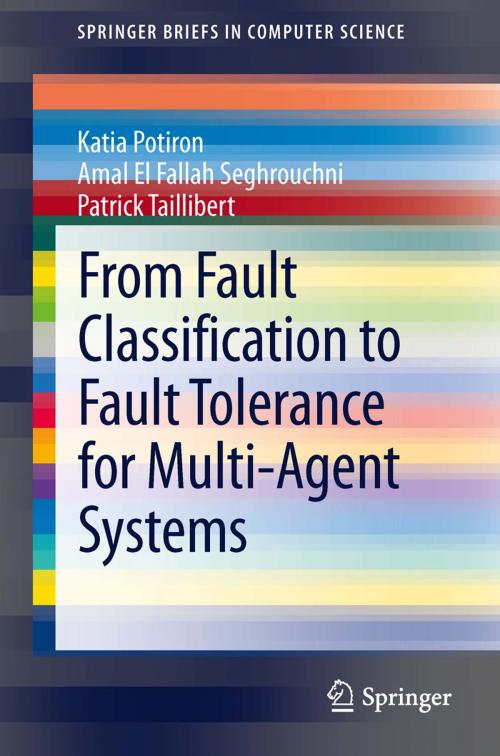From Fault Classification to Fault Tolerance for Multi-Agent Systems
Nonfiction, Science & Nature, Technology, Quality Control, Computers, Advanced Computing, Artificial Intelligence, General Computing| Author: | Katia Potiron, Amal El Fallah Seghrouchni, Patrick Taillibert | ISBN: | 9781447150466 |
| Publisher: | Springer London | Publication: | March 21, 2013 |
| Imprint: | Springer | Language: | English |
| Author: | Katia Potiron, Amal El Fallah Seghrouchni, Patrick Taillibert |
| ISBN: | 9781447150466 |
| Publisher: | Springer London |
| Publication: | March 21, 2013 |
| Imprint: | Springer |
| Language: | English |
Faults are a concern for Multi-Agent Systems (MAS) designers, especially if the MAS are built for industrial or military use because there must be some guarantee of dependability. Some fault classification exists for classical systems, and is used to define faults. When dependability is at stake, such fault classification may be used from the beginning of the system’s conception to define fault classes and specify which types of faults are expected. Thus, one may want to use fault classification for MAS; however, From Fault Classification to Fault Tolerance for Multi-Agent Systems argues that working with autonomous and proactive agents implies a special analysis of the faults potentially occurring in the system. Moreover, the field of Fault Tolerance (FT) provides numerous methods adapted to handle different kinds of faults. Some handling methods have been studied within the MAS domain, adapting to their specificities and capabilities but increasing the large amount of FT methods. Therefore, unless being an expert in fault tolerance, it is difficult to choose, evaluate or compare fault tolerance methods, preventing a lot of developed applications from not only to being more pleasant to use but, more importantly, from at least being tolerant to common faults. From Fault Classification to Fault Tolerance for Multi-Agent Systems shows that specification phase guidelines and fault handler studies can be derived from the fault classification extension made for MAS. From this perspective, fault classification can become a unifying concept between fault tolerance methods in MAS.
Faults are a concern for Multi-Agent Systems (MAS) designers, especially if the MAS are built for industrial or military use because there must be some guarantee of dependability. Some fault classification exists for classical systems, and is used to define faults. When dependability is at stake, such fault classification may be used from the beginning of the system’s conception to define fault classes and specify which types of faults are expected. Thus, one may want to use fault classification for MAS; however, From Fault Classification to Fault Tolerance for Multi-Agent Systems argues that working with autonomous and proactive agents implies a special analysis of the faults potentially occurring in the system. Moreover, the field of Fault Tolerance (FT) provides numerous methods adapted to handle different kinds of faults. Some handling methods have been studied within the MAS domain, adapting to their specificities and capabilities but increasing the large amount of FT methods. Therefore, unless being an expert in fault tolerance, it is difficult to choose, evaluate or compare fault tolerance methods, preventing a lot of developed applications from not only to being more pleasant to use but, more importantly, from at least being tolerant to common faults. From Fault Classification to Fault Tolerance for Multi-Agent Systems shows that specification phase guidelines and fault handler studies can be derived from the fault classification extension made for MAS. From this perspective, fault classification can become a unifying concept between fault tolerance methods in MAS.















